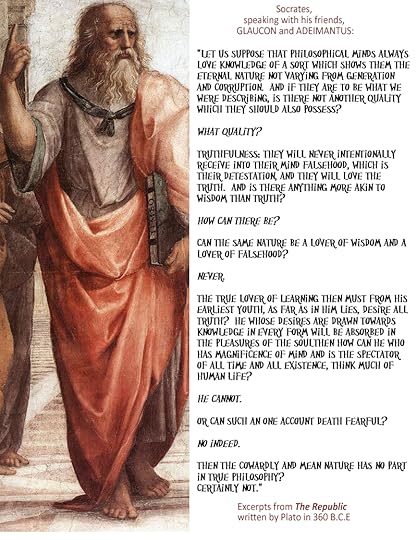Lawrence R. Spencer's Blog, page 456
June 3, 2016
THE SIGNIFICANCE OF SILENCE
This following medieval manuscript is kept in the British Library. The language indicates that it was written about a thousand years ago. The text is written in Old Irish and was translated by Dennis King.
“The Irish text finally surfaced in print in 1926, in volume two of the Catalogue of Irish manuscripts in the British Museum, compiled by Robin Flower.
Very few texts in Old Irish survive in their original written form. In almost all cases, the material was copied and recopied from older manuscript compilations into newer ones, as the old books wore out.
The language of this little anecdote is arguably more than a thousand years old, but the anecdote survives only in a paper manuscript in the British Library known as Egerton 190, copied in 1709 by Richard Tipper of Mitchelstown, Co. Dublin,” Dennis King said.
This is the text of the manuscript, translated into English:
“Three monks turned their back on the world. They go into the wilderness to repent their sins before God.
They did not speak to one another for the space of a year. Then one of the men said to another at the end of the year, “We are well,” said he.
Thus it was for another year. “It is well indeed,” said the second man.
They were there after that for another year. “I swear by my habit,” said the third man, “if you do not allow me some quiet I will abandon the wilderness entirely to you!”
_______________________________
Repost from the original article: Is This The Worlds Oldest Joke?
Originally posted 2012-10-11 13:00:58. Republished by Blog Post Promoter
AMERICAN MASKS IN JAPAN
We’re not all from the same planet….
Originally posted 2012-02-23 12:41:23. Republished by Blog Post Promoter
June 2, 2016
HOLLYWOOD
 NWO INDOCTRINATION
NWO INDOCTRINATIONHolly Wood is “said” to be a symbol of goodwill, peace, health and happiness. Holly is also “said” to be one of the sacred trees of the faith of Wicca/Witchcraft. In folklore, the Holly tree/bush is associated with the spirit of vegetation and with the waning forces of nature. The mythical figure of the Holly King in the personification of the spirit of the holly. The Holly King rules nature during its decline from mid-summer through to mid-winter, when, at the winter solstice, he is defeated in ritual combat by his brother the Oak King.
In the 1960’s the Council on Foreign Relations and the Institute of International Affairs (New World Order front groups) decided which film industry would create the international culture of the future. It was agreed that Hollywood would be given the job to create the worldwide culture to the general public to create a global society. This was an easy decision since the film industry is owned and operated by members of the “Global Elite“.
Holly wood is named “holy wood”. The holy wood is the staff of the magi or the staff of the grand Magus (of occultism). The magi waves his wand and everything is changed with the casting of a spell. This staff was traditionally made with holly wood (as are chess pieces). It was used by John Dee, the court magician of Queen Elizabeth.
The people that named it knew what they where doing, they had a plan to indoctrinate their views on the unsuspecting movie goers.
The advent of the movies showing popular appeal for ideological purpose (brainwashing) that the unwary view as entertainment.
June 1, 2016
COMPUTER GODDESS
As “science” has become the unofficial “religion” of Western “civilization” in the 21st Century it is only right and fitting that we should create aesthetic images and mythology about the “divinities” of science. And, as our civilization, and perhaps our entire universe, is manipulated by computer programming it is only fitting that we worship the “Goddess of Computers”.
 Augusta Ada King-Noel, Countess of Lovelace (née Byron; 10 December 1815 – 27 November 1852) was an English mathematician and writer, chiefly known for her work on Charles Babbage’s early mechanical general-purpose computer, the Analytical Engine. Her notes on the engine include what is recognised as the first algorithm intended to be carried out by a machine. As a result, she is often regarded as the first computer programmer. Ada Lovelace was the only legitimate child of the poet George Lord Byron and his wife Anne Isabella Milbanke (“Annabella”), Lady Wentworth.
Augusta Ada King-Noel, Countess of Lovelace (née Byron; 10 December 1815 – 27 November 1852) was an English mathematician and writer, chiefly known for her work on Charles Babbage’s early mechanical general-purpose computer, the Analytical Engine. Her notes on the engine include what is recognised as the first algorithm intended to be carried out by a machine. As a result, she is often regarded as the first computer programmer. Ada Lovelace was the only legitimate child of the poet George Lord Byron and his wife Anne Isabella Milbanke (“Annabella”), Lady Wentworth.
As a teenager, her mathematical talents led her to an ongoing working relationship and friendship with fellow British mathematician Charles Babbage, also known as ‘the father of computers’, and in particular, Babbage’s work on the Analytical Engine. Lovelace first met him in June 1833, through their mutual friend, and her private tutor, Mary Somerville. Between 1842 and 1843, Ada translated an article by Italian military engineer Luigi Menabrea on the engine, which she supplemented with an elaborate set of notes, simply called Notes. These notes contain what many consider to be the first computer program—that is, an algorithm designed to be carried out by a machine.
 By Ada Lovelace – http://www.sophiararebooks.com/pictures/3544a.jpg, Public Domain, https://commons.wikimedia.org/w/index.php?curid=37285970
By Ada Lovelace – http://www.sophiararebooks.com/pictures/3544a.jpg, Public Domain, https://commons.wikimedia.org/w/index.php?curid=37285970
BEING YOU
Mohandas Karamchand Gandhi; 2 October 1869 – 30 January 1948), commonly known as Mahatma Gandhi or Bapu (Father of Nation), was the preeminent leader of Indian nationalism in British-ruled India. Employing non-violent civil disobedience, Gandhi led India to independence and inspired movements for non-violence, civil rights and freedom across the world.
The son of a senior government official, Gandhi was born and raised in a Bania community in coastal Gujarat, and trained in law in London. Assuming leadership of the Indian National Congress in 1921, Gandhi led nationwide campaigns for easing poverty, expanding women’s rights, building religious and ethnic amity, ending untouchability, increasing economic self-reliance, and above all for achieving Swaraj—the independence of India from British domination.
In London he committed himself to truthfulness, temperance, chastity, and vegetarianism. His return to India to work as a lawyer was a failure, so he went to South Africa for a quarter century, where he absorbed ideas from many sources, most of them non-Indian. He was exposed to Jain ideas through his mother who, was in contact with Jain monks. Themes from Jainism that Gandhi absorbed included asceticism; compassion for all forms of life; the importance of vows for self-discipline; vegetarianism; fasting for self-purification; mutual tolerance among people of different creeds; and “syadvad”, the idea that all views of truth are partial.
Gandhi strongly favored the emancipation of women, and he went so far as to say that “the women have come to look upon me as one of themselves.” He opposed purdah, child marriage, untouchability, and the extreme oppression of Hindu widows, up to and including sati. He especially recruited women to participate in the salt tax campaigns and the boycott of foreign products. Gandhi’s success in enlisting women in his campaigns, including the salt tax campaign, anti-untouchability campaign and the peasant movement, gave many women a new self-confidence and dignity in the mainstream of Indian public life.
In his last year, unhappy at the partition of India, Gandhi worked to stop the carnage between Muslims, Hindus and Sikhs that raged in the border area between India and Pakistan. He was assassinated on 30 January 1948.
Gandhi’s philosophy was not theoretical but one of pragmatism, that is, practicing his principles in the moment. Asked to give a message to the people, he would respond, “My life is my message.”
Originally posted 2013-06-19 12:05:59. Republished by Blog Post Promoter
POINTS OF LIGHT
May 31, 2016
THE PHILOSOPHICAL MIND

“Philosophical minds always love knowledge of a sort which shows them the eternal nature not varying from generation and corruption. He whose desires are drawn towards knowledge in every form will be absorbed in the pleasures of the soul. Then how can he who has magnificence of mind and is the spectator of all time and all existence, think much of human life?
He cannot.
Or can such an one account death fearful?
No indeed.
Then the cowardly and mean nature has no part in true philosophy?
Certainly not.
Or again: can he who is harmoniously constituted, who is not covetous or mean, or a boaster, or a coward-can he, I say, ever be unjust or hard in his dealings?
Impossible.
Then you will soon observe whether a man is just and gentle, or rude and unsociable; these are the signs which distinguish even in youth the philosophical nature from the unphilosophical. ”
Plato, THE REPUBLIC, 360 BCE
Originally posted 2011-11-25 23:11:42. Republished by Blog Post Promoter
POWER OF WORDS
BUILD A BEE HOTEL
Many species of bees are solitary – the do not live in hives but instead construct their own nest. The main reason for this is because in these species every female is fertile and this would not make for comfortable communal living in a hive.
Bee hotels are necessary for a number of different reasons. To begin with bee populations have been on a decline in recent years. Part of the problem is that their natural habitats have been cleared to make way for intensive agriculture. Pesticides have also been instrumental in their decline.

It is often difficult to encourage solitary bees in urban areas because there are so few suitable nesting places for them. So, many people chose to give nature a helping hand by building their own bee hotel, sometimes known as a bug or insect hotel.
We may not know these solitary bees as well as their hive dwelling counterparts but they make up more than 90 percent of the bee population.There are many species which can take advantage of human made hotels. They do not care whether their hotel is fastidiously organized or rather more haphazardly put together.

Image Credit Flickr User Swamibu
The above, for example, was specifically made for Red Mason bees. They are a staggering fifty times more effective at pollination than the better known honey bees. This hotel has 300 individual apartments to encourage this little known superhero of pollination. No need to worry about stings either, Red Mason are extremely docile and very rarely sting.
As you can see from the photograph they can come in many shapes and sizes but there are a number of things which remain constant. The materials used are mostly natural and include wood, tiles or simply old stone walls. Holes are drilled in to these materials which are large and long enough to encourage the solitary bees as well other insects to enter and oviposit their single egg or to gestate.
As you can see from the photograph they can come in many shapes and sizes but there are a number of things which remain constant. The materials used are mostly natural and include wood, tiles or simply old stone walls. Holes are drilled in to these materials which are large and long enough to encourage the solitary bees as well other insects to enter and oviposit their single egg or to gestate.
If this has encouraged you to find out how to make your own bee hotel then Friends of the Earth have come up with a really neat plan which is ideal for a small suburban garden. It comes with step by step instructions and can be made cheaply and easily.
via Welcome to the Bee Hotel ~ The Ark In Space.
Originally posted 2012-06-13 11:02:58. Republished by Blog Post Promoter
May 30, 2016
RUBY SLIPPERS
 “Take special care of those Ruby Slippers. I want those most of all!” — The Wicked Witch of the West in ‘The Wizard of Oz’
“Take special care of those Ruby Slippers. I want those most of all!” — The Wicked Witch of the West in ‘The Wizard of Oz’Definition: Vested Interest–1/ a survival or non-survival plan or agenda which has been “clothed” to make it seem like something other than what it actually is; 2/ any person, group or entity which prevents or controls communication to serve their own purposes.
Example: Governments control communication between the people of their country. You must get a passport to travel to another country. You must pass through a customs’ inspection in order to enter the country. You must pay taxes (money is a form of communication). You must get a license to get married or go into business.
Example: Religions prevent and control communication between people and the gods, saints and spirits. You have to pay the priest money for him to “bless” you or to “absolve” you of “sin” as a supposed representative of the god(s).
Example: A husband usually tries to prevent communication between his wife and other potential lovers.
What would happen if you could safely communicate with everything and everyone?

Political, religious and financial vested interests, typically, DO NOT want people to answer this question. The reason is simple: if you could safely communicate with anyone or anything, they would be out of business!
Such institutions very frequently determine what we are allowed to believe by feeding us their version of “the truth”. Our “belief” in their version of “the truth” is usually backed up by the threat of death, imprisonment, excommunication or bankruptcy.
All human beings have flesh bodies. Flesh bodies require food, shelter, clothing and as many other goods and creature comforts as one can buy, borrow or pillage. This seems to be a common denominator of survival. It is also a source of illogical thinking which has tended to clog the water mains of our minds with all manner of unspeakable refuse: namely, our vested interest in survival.”
__________________________
Excerpt from THE OZ FACTORS, by Lawrence R. Spencer
Originally posted 2011-07-28 23:39:33. Republished by Blog Post Promoter










